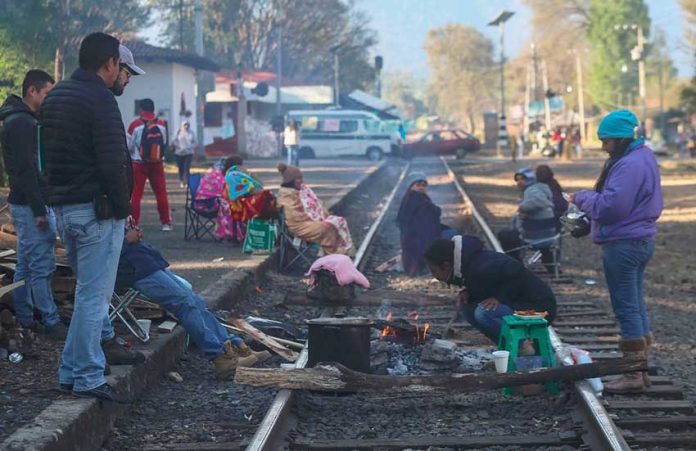The federal government will give Michoacán teachers another 800 million pesos today, President López Obrador said this morning, as rail blockades in the state cost the economy an estimated 1 billion pesos a day.
“On Friday, 205 million pesos was delivered and today 800 million pesos is going to the teachers in Michoacán, in other words a billion pesos [US $52.5 million] . . .” López Obrador told reporters at his daily press conference.
Teachers have maintained railroad blockades in Michoacán since January 14 to demand payment of salaries, benefits and bonuses they say they are owed by the state government.
CNTE teachers’ union leaders said last week that they want 5 billion pesos before they will end their blockades and return to the classroom.
While that amount of money appears unlikely to be forthcoming, López Obrador reiterated that the government would not forcibly remove the teachers from the railway tracks, stating that repression wasn’t an option.
“I hope that they [the teachers] take notice that they have already been attended to and they take the decision to free the tracks . . .” López Obrador said.
The president said that CNTE members participating in the protest “have to understand that these are other times,” asserting that “we’re not against the people, nor are we oppressors.”
However, he added that the government wouldn’t allow itself to be blackmailed by the teachers’ union.
López Obrador also said that it was ultimately up to the state government to end the dispute with teachers.
“It’s not the federal government’s responsibility, we can’t deal with something that corresponds to the state [government]. We’re helping by transferring those funds to the state government and I hope things are resolved,” he said.
However, Michoacán Governor Silvano Aureoles believes that the rail blockade is an issue for which the federal government is responsible.
After the Secretary of Communications and Transportation, Javier Jiménez Espriú, took to Twitter yesterday to assert that “the labor conflict between the CNTE and the government of Michoacán is damaging the national economy” and to exhort “the parties to consider the national interest,” Aureoles responded that that the federal government cannot wash its hands of the matter.
“Michoacán is grateful for your ‘exhortation’ but also we remind you that the railway lines fall under federal jurisdiction, in other words, they’re your responsibility as secretary of communications and transportation,” he wrote.
“We ask you to assume [the responsibility] that corresponds to you and for the good of the residents of Michoacán and the economy of the state and nation, to formally intervene to guarantee the immediate clearing of the railway lines,” Aureoles said in a second tweet.
Today, the governor launched legal action against the blockades in the Supreme Court, declaring “it may be that the [federal] government decides not to use public force [to clear the tracks] but a judge can order it.”
Meanwhile, the economic losses from the rail blockades continue to mount.
The Confederation of Industrial Chambers (Concamin) estimates that the blockades are costing around 1 billion pesos a day, a figure with which the spokeswoman for rail operator Ferromex agreed.
Lourdes Aranda said that a total of 200 trains have been halted, explaining that auto parts, gasoline and imported grains are among the products that have been unable to reach their intended destination.
Concamin president Francisco Cervantes said that 8,600 shipping containers have been affected by the blockades.
The steel industry, which reported losses of more than 800 million pesos, is just one of several sectors that have taken an economic hit from the blockades.
In light of the growing financial damage, the president of the Michoacán branch of the Business Coordinating Council (CCE) urged the federal government to change its approach to dealing with the blockades, telling the newspaper Milenio that the current strategy won’t clear Michoacán’s railroads.
“This [strategy] of continuing to talk and if the dialogue ends to keep talking some more [won’t work]. We’re not calling for repression . . . but we are calling for the complete application of the rule of law. It’s an issue that has already exceeded the limit of tolerance, it’s having a very large economic impact that is hitting the whole country,” Agustín Arriaga said.
The CCE leader said it was unacceptable that teachers should stop the economy and that force could be used without violating their rights.
“Remove them, let the dialogue continue [but] they have to remove them, that’s what you have the rule of law for,” Arriaga said.
Some teachers claimed that the losses caused by the blockades are not being incurred by Mexico but by foreign businesses.
Source: Milenio (sp), El Financiero (sp), El Universal (sp)
